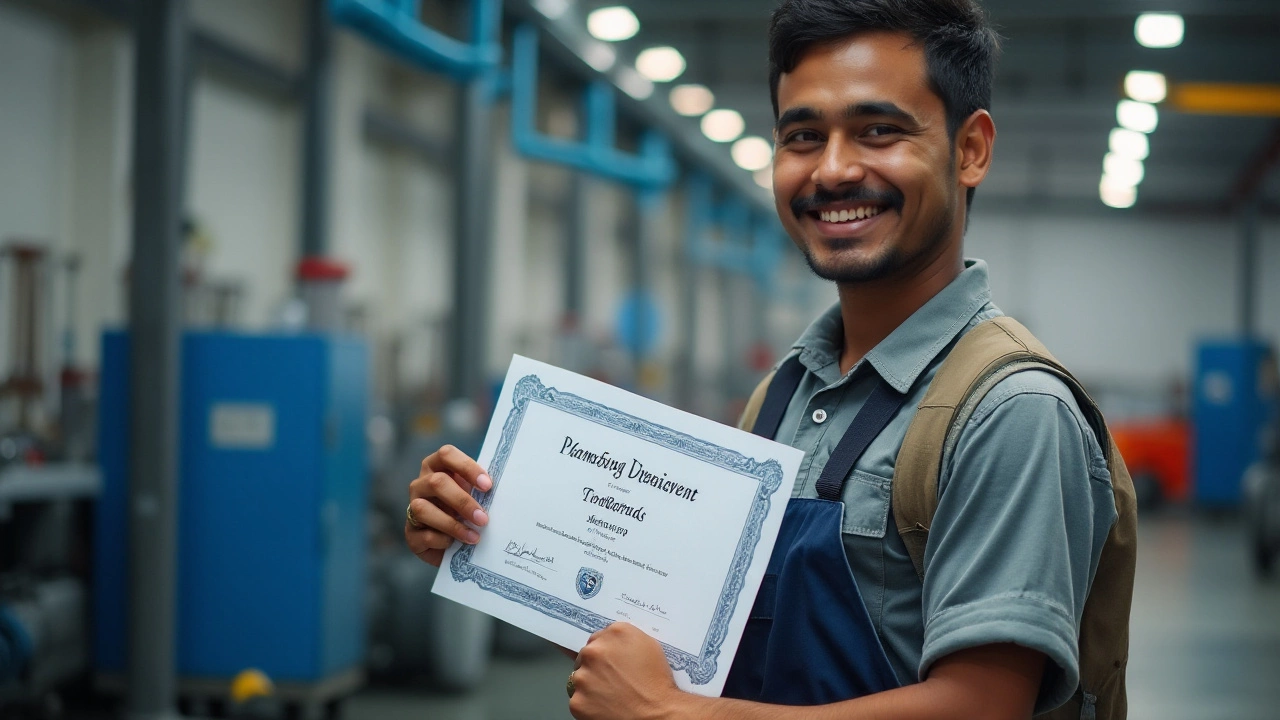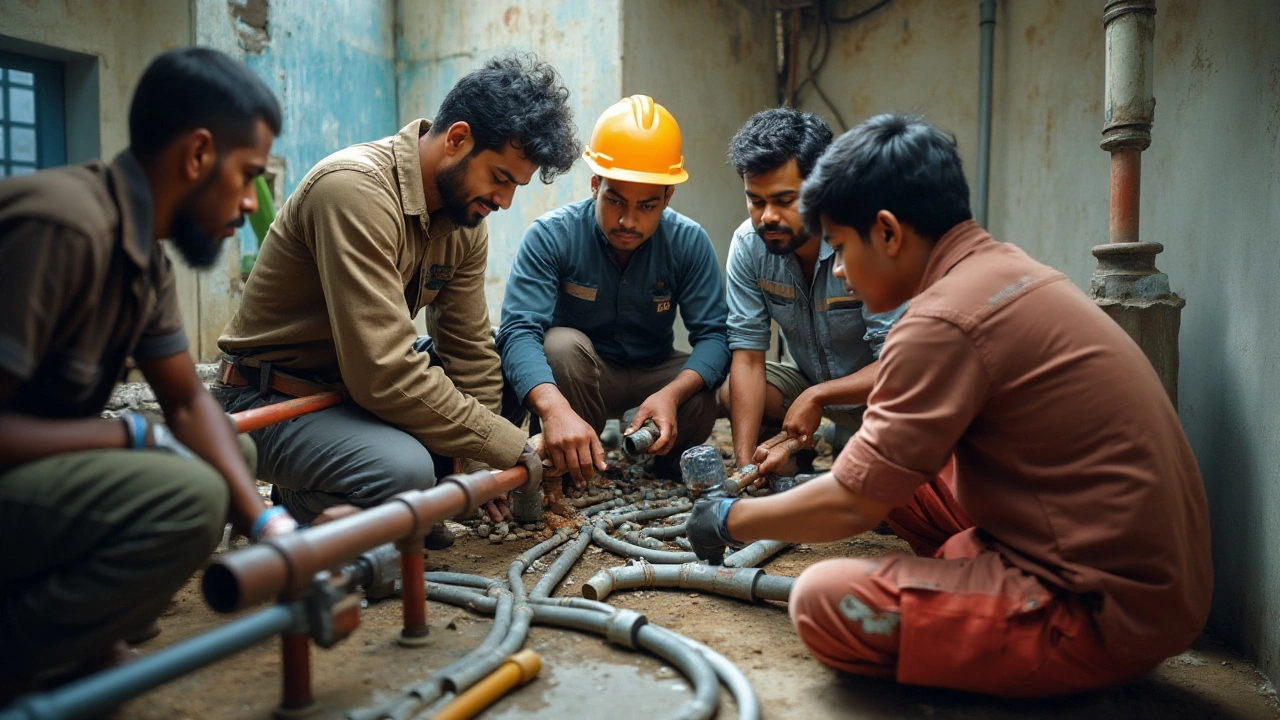
In the bustling world of trades, plumbing stands out as a profession with substantial earning potential and a promising future. With the constant need for installation, maintenance, and repair in both residential and commercial settings, skilled plumbers are never short of work. If you're considering entering this profitable field, selecting the right training course is essential to maximizing your success.
The right education can equip you with practical skills and industry-recognized certifications, paving the way for higher wages and more job opportunities. Whether you're just starting out or seeking to advance your expertise, understanding which courses offer the best return on investment is crucial for your long-term career prospects.
- The Demand for Skilled Plumbers
- Choosing the Right Course
- Essential Skills and Certifications
- Earning Potential and Opportunities
- Tips for Aspiring Plumbers
The Demand for Skilled Plumbers
The need for skilled plumbers has never been greater, driven by both domestic and commercial demands. As urban areas continue to expand and houses age, the infrastructure requires constant upkeep and upgrading, creating a steady stream of work for plumbers. Construction booms in developing regions add another layer of need, not just for basic plumbing but for sophisticated installations that can keep up with new technologies and ever-changing regulations. This is especially relevant in cities where smart building technologies are becoming the norm. Plumbers who are trained in the latest technologies can easily find work, often with substantial salaries to match their skills.
Adding to the demand is a growing emphasis on water conservation and energy efficiency. Homeowners and businesses alike are investing in systems that save water and reduce energy bills, which requires expert plumbers who can design and install these systems effectively. Programs that provide rebates and tax incentives for upgrading to efficient plumbing systems have been a significant motivator for this shift. This trend has created a niche market within the broader plumbing industry, offering higher pay opportunities for those specializing in eco-friendly solutions.
"As older generations of plumbers retire, there are gaps in the workforce that need filling," says Jane Smith, CEO of Plumbing Professionals of America. "This is a fantastic time for young people to enter the trade."
Compounding the issue is the fact that many veteran plumbers are reaching retirement age, leaving behind roles that need to be filled by new entrants. Traditional vocational training has struggled to keep pace with this turnover, making plumber training courses that much more critical. Governments and trade associations are keenly aware of this shortfall, resulting in heightened efforts to attract a young, diverse workforce. Initiatives include apprenticeship programs, scholarships, and training grants, all designed to entice new blood into the field.
In terms of visibility, plumbing might not have the glamour of more well-publicized professions, but it carries undeniable job security that many other industries cannot offer. With an average growth rate predicted by many labor departments at over 10% for plumbing jobs over the next decade, it's clear that those willing to don the tool belt will find a plethora of opportunities. According to a 2024 survey by the National Bureau of Labor Statistics, the median pay for plumbers in the United States was $60,000 annually, with top earners making upwards of $90,000, a figure set to increase as demand outstrips supply.
Choosing the Right Course
Selecting the right plumber training program is a pivotal step in ensuring a successful and prosperous career in the plumbing industry. With numerous options available, it's essential to focus on courses that provide not only theoretical knowledge but also practical hands-on experience. A good course should offer a blend of classroom instruction and real-world application, preparing students to tackle a variety of plumbing tasks with confidence and skill.
When evaluating courses, it's helpful to consider accreditation and the reputation of the institution or training provider. Accredited programs adhere to industry standards, ensuring that the curriculum is comprehensive and up-to-date. This is crucial as it maintains the quality of education and often influences employability. It's also wise to check if the program offers certification upon completion. Certificates are not just pieces of paper; they often serve as proof of competence, validating one's skills in the eyes of potential employers.
Plumbing career seekers should also inquire about the program's connection with local trade organizations and companies. Some courses have partnerships that facilitate apprenticeships or direct job placements, providing new plumbers with a foot in the door in the competitive job market. Moreover, the instructors' expertise and industry experience play a significant role in shaping the quality of education. Seasoned plumbers leading the classes can share invaluable insights and real-life experiences that greatly enhance learning.
"A good training course not only teaches the skills needed on the job but also imparts the importance of safety and adherence to local codes," says Mark Jansson, a master plumber with over 20 years of teaching experience.
Investing in a high-paying plumbing education course is about balancing cost and benefits. While tuition fees can be a consideration, the potential return on investment, in terms of higher wages and job satisfaction, often justifies the expense. Some programs offer financial aid, scholarships, or payment plans to ease the financial burden. Prospective students should ask providers about these options as well as any hidden costs, such as equipment or examination fees, to ensure there are no surprises down the line.
As plumbing technology evolves, courses that incorporate the latest tools and practices, such as green plumbing solutions and digital diagnostics, stand out. These modern elements are becoming increasingly important as sustainability and energy efficiency become key industry issues. With the right training, new plumbers can leverage these skills to enhance their career opportunities and meet the growing demand for eco-friendly solutions.
Key Factors for Selecting a Course
- Accreditation and certification opportunities
- Practical and hands-on learning experience
- Instructor expertise and experience
- Connections with trade organizations and job placement services
- Financial aid and cost considerations
- Incorporation of modern plumbing technology and eco-friendly practices

Essential Skills and Certifications
Choosing the right path in the world of plumbing not only involves selecting a reputable training course but also mastering a set of critical skills and obtaining necessary certifications. As anyone familiar with this profession can tell you, it's a trade that demands a mix of technical know-how, problem-solving abilities, and a good dose of dexterity. Plumber training courses often emphasize the significance of understanding plumbing systems thoroughly. This includes everything from the basics of installing pipes to the finer points of diagnosing complex systems in large commercial buildings.
Beyond the technical aspects, effective communication skills play a crucial role. A plumber must effectively converse with clients who may not be technically minded, explaining the issues and solutions in an easily digestible manner. This skill is often left out of traditional training, but its importance cannot be overstated. If a plumber can clearly articulate what needs to be done, they are more likely to gain customer trust and new business through referrals.
A Closer Look at Certifications
Acquiring the right plumbing certifications can significantly enhance a plumber's career. Certifications signal to potential employers or clients that you have met a certain standard of knowledge and competence in the trade. In many regions, passing an exam and obtaining a license is mandatory before you can legally work as a plumber. The specific requirements can vary, but they typically include a blend of classwork and practical on-the-job training.
"The skills and certifications a plumber holds are like a passport to the global world of work," notes James Adair, a well-regarded expert in the trade industry. "They open doors to opportunities not just locally but internationally as well."
Some of the most beneficial certifications include those from organizations like the National Inspection Testing Certification (NITC) or the Environmental Protection Agency (EPA). These certifications not only cover the safe handling of various plumbing tools and materials but also address modern concerns like sustainability and eco-friendly systems.
Practical experience is another key aspect, and a structured apprenticeship is often the best way to gain it. Many courses provide this vital hands-on training as part of the curriculum, allowing students to learn under the tutelage of experienced professionals. Apprenticeships can range from a few months to several years, depending on the complexity of the skills taught and the local regulatory requirements.
According to a recent study, plumbers with diverse skills and certifications can earn significantly more than those without these credentials. A report by the Bureau of Labor Statistics found that certified plumbers often command wages up to 30% higher than their uncertified peers. This clearly underscores the value of pursuing both comprehensive plumbing training and the acquisition of recognized certifications in this field.
Earning Potential and Opportunities
When considering a career in plumbing, one of the primary motivators is unquestionably the lucrative earning potential. With the continuous growth in industries and households leaning on dependable water systems, the demand for skilled plumbers has surged consistently. On average, a well-trained plumber can anticipate earning a respectable starting salary immediately upon completion of their plumber training. As they gain experience, many see their incomes grow substantially, especially those who specialize in high-demand areas like hydronic systems or green plumbing solutions.
The median annual wage for plumbers, pipefitters, and steamfitters stands at a competitive level, with the top tier earning significantly more. In particular, those who invest in advanced plumbing education and obtain certifications in specialized fields often find themselves in high demand, commanding top-dollar salaries. Specializations such as backflow prevention and pipe design not only make a plumber more marketable but also open up opportunities to work on larger, more complex projects that pay handsomely. The financial incentives don't just stop at wages, for there are bonuses and perks often included in job contracts due to the high demand for their services.
The Role of Geography and Experience
Geographical location plays a crucial role in determining how much a plumber can earn. Urban areas with booming construction projects typically offer higher wages due to increased demand and cost of living adjustments. In states like California and Alaska, for example, plumbers can expect to see some of the highest salaries in the country. Yet, the financial prospects don't just hinge on location; experience is a potent catalyst for increased earnings. As plumbers master various techniques and build their reputation, they often receive opportunities to take on supervisory roles, where their responsibilities—and salaries—grow significantly.
"The plumbing industry offers substantial rewards for those willing to invest time in learning and improving their skills," said James Bertram, a seasoned plumbing industry expert, in a recent interview with Plumbing Today magazine. "The combination of practical experience and targeted education is the key to unlocking numerous opportunities, both financially and professionally."
Beyond working for established companies, many experienced plumbers choose to set up their own businesses. This entrepreneurial path offers both independence and the potential for even greater financial returns. Being your own boss comes with its challenges, but the upside includes the flexibility to pick projects, set your own rates, and build a brand that could become synonymous with quality within the community. Plumbing career pathways also exist in fields like water conservation consultancy or sustainable solutions, opening yet another avenue for income.

Tips for Aspiring Plumbers
Starting out in the plumbing industry might seem daunting at first, but with the right guidance, you can carve a successful career path. One of the first things any budding plumber should do is immerse themselves in the learning process. Choosing high-quality training will provide you with a solid foundation, but it's essential to stay curious and continually seek out new information about the ever-evolving techniques and tools in the trade. Shadowing seasoned plumbers and gaining hands-on experience is invaluable, as it exposes you to real-world scenarios that you might not encounter in a classroom setting.
Another critical step is building a comprehensive understanding of the essential skills and certifications required in the field. Certifications not only validate your expertise but also make you a more attractive candidate to potential employers. Pursuing specialized certifications in areas such as gas fitting or pipe welding can significantly enhance your earning potential. It's also important to pay attention to safety procedures and regulations, as adhering to these not only ensures your wellbeing but also builds credibility with clients and colleagues.
Networking plays a pivotal role in advancing your career within the plumbing industry. Developing connections with fellow professionals can help you gain insights into industry trends and job opportunities. Joining local trade organizations or online professional groups can facilitate these relationships and keep you updated on local and national developments in the plumbing world. Building a strong, professional network takes time and effort, but it often leads to mentorship opportunities and collaborations that can be beneficial in the long run.
For those aiming to maximize their earning potential in plumbing, considering additional certifications and diversifying your skill set is key. Statistics suggest that plumbers who invest in ongoing education and gain proficiency in emerging technologies and systems are better poised to take on lucrative jobs. Since the demand for specialized plumbers is on the rise, focusing on niche areas like eco-friendly installations and smart home plumbing solutions can set you apart from the competition.
"The plumbing industry is always moving forward. Staying informed and adaptable is what sets the top professionals apart," says industry expert James Patterson, a recognized figure in plumbing education and training.
Lastly, maintaining high standards of quality and integrity in every job you do builds a reputation that precedes you. Many successful plumbers attribute their achievements not only to their technical abilities but also to their dedication to customer satisfaction and ethical practices. Remember, the work you deliver is often the most powerful advertisement for your services. By constantly honing your craft and keeping the customer's needs at the forefront, you ensure consistent growth and potential in your plumbing career.
